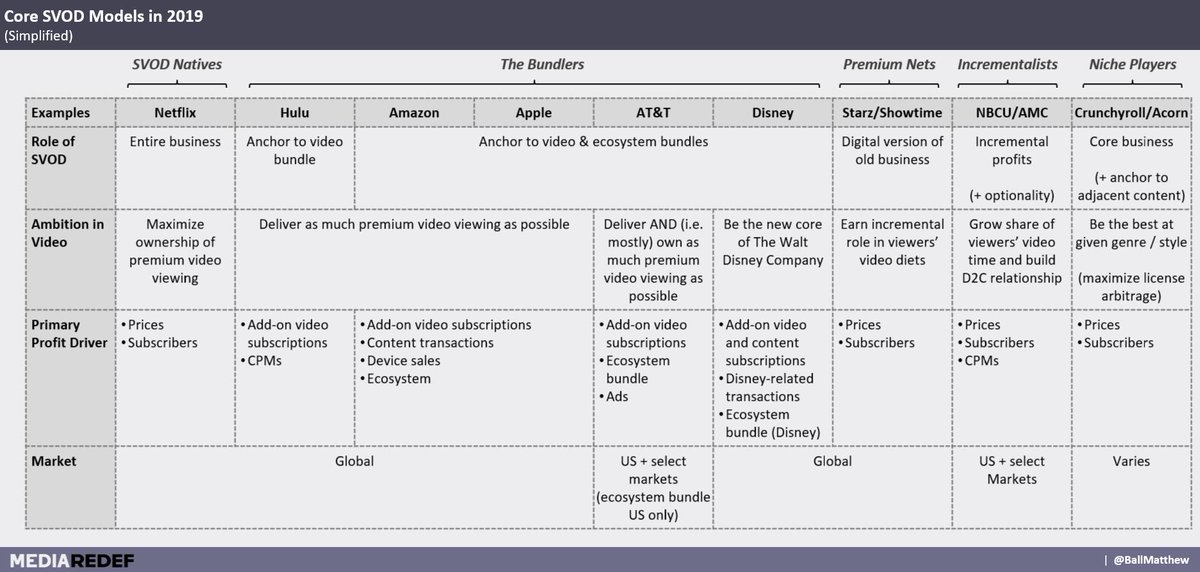1/ Most HBO Max commentary overlooks why a "telephone company" bought a media co in the first place
AT&T plans to invest $4B in HBO Max, after $108B buying TimeWarner + before accounting for Max-related declines in Turner/DirecTV etc
Goal? +$1B a year in profit in 2024. Weird!
AT&T plans to invest $4B in HBO Max, after $108B buying TimeWarner + before accounting for Max-related declines in Turner/DirecTV etc
Goal? +$1B a year in profit in 2024. Weird!
2/ Why would AT&T, which generates $29B in cash per year (more than almost any public company in the world), do such a thing?
It's not really HBO Max upside: driving from $6B+ revenues and $2B+ profit to $7B and $3B. Yay?
It's the $72B wireless arm (there's also Xandr, below)
It's not really HBO Max upside: driving from $6B+ revenues and $2B+ profit to $7B and $3B. Yay?
It's the $72B wireless arm (there's also Xandr, below)
3/ Every 0.1% reduction in AT&T Mobility churn (~2.9% per month) generates ~ $350MM in annual cash profit for AT&T.
Then there's new customers. AT&T spends $300+ to get new wireless customers. It does this ~5MM times per year. If free HBO drops this cost, it saves enormously
Then there's new customers. AT&T spends $300+ to get new wireless customers. It does this ~5MM times per year. If free HBO drops this cost, it saves enormously
4/ To this end, there's a weirdness to praising Amazon Prime Video as a free "orthogonal strategy" to the Prime Membership, or Verizon using free Disney+ to attract/retain subscribers, but then saying this strategy is dumb and AT&T should be a dumb pipe telco
5/ This connects to the key feature of the Internet: zero marginal costs (in turn why network effects are so valuable)
It costs AT&T nothing to give a customer free HBO Max, but the customer will value free HBO >$0.
Giving discounts, retention promos, etc., DOES cost AT&T
It costs AT&T nothing to give a customer free HBO Max, but the customer will value free HBO >$0.
Giving discounts, retention promos, etc., DOES cost AT&T
6/ And every additional HBO Max customer drops the allocated programming cost for every other subscriber, thus increasing contribution for ALL subs
Note that Verizon has to pay Disney maybe $4-5 per month for every sub that gets Disney+ "Free". There are HIGH marginal costs here
Note that Verizon has to pay Disney maybe $4-5 per month for every sub that gets Disney+ "Free". There are HIGH marginal costs here
7/ AT&T also plans to launch an ad-supported HBO Max (maybe $7-10 per month). Odds are that when this is released, it will become the "free" HBO Max.
This will still give AT&T churn/acquisition benefits, but now it'll generate incremental, zero marginal cost revenue from ads
This will still give AT&T churn/acquisition benefits, but now it'll generate incremental, zero marginal cost revenue from ads
8/ And in turn, HBO Max is overall intended to drive data/scale/revenue to AT&T's would-be competitor to Google & Facebook, Xandr.
The "3rd ad platform" strategy has been tried by many (Yahoo, Verizon, Snap) and has never worked, but is the plan
The "3rd ad platform" strategy has been tried by many (Yahoo, Verizon, Snap) and has never worked, but is the plan
9/ This isn't to say AT&T will generate a great return on $108B TimeWarner, but focusing on whether HBO goes from 35MM subs to 50MM subs, and whether that's "worth it" misses the point.
AT&T will get there, if just because it gives it away for free - because that IS the point
AT&T will get there, if just because it gives it away for free - because that IS the point
10/ Of course giving HBO Max away has a cost - some previously paid, some would have paid, Warner could have licensed titles to Netflix, etc.
But MOST don't have HBO today. Netflix has 2x the subs, still growing.
And Netflix is playing in a fairly small market - pay TV
But MOST don't have HBO today. Netflix has 2x the subs, still growing.
And Netflix is playing in a fairly small market - pay TV
11/ Wireless is a MUCH larger business. Maximizing video is worth a lot less to AT&T (or anyone) than maximizing wireless , digital advertising, digital retail (Amazon), smartphones and services (Apple), etc.
Which is why it's the dominant strategy today https://www.matthewball.vc/all/minedmedia
Which is why it's the dominant strategy today https://www.matthewball.vc/all/minedmedia
12/ Gets to absurdity of "distribution v content", "Hollywood v Tech" or "telephone company v media".
Everything is a platform/ecosystem now. Pure play media been getting squeezed since the 60s.
Insolvency forced Columbia to Coca Cola, then a TV maker https://twitter.com/ballmatthew/status/1191041406959267841?s=20
Everything is a platform/ecosystem now. Pure play media been getting squeezed since the 60s.
Insolvency forced Columbia to Coca Cola, then a TV maker https://twitter.com/ballmatthew/status/1191041406959267841?s=20
13/ Also this connects to the inevitable paid add-ons of CNN, Turner Sports and AT&T Live TV
Bigger HBO Max is a ground game play to drive other businesses with marginal costs and without having to pay iOS or Amazon fees. Giving it away for free continues to pay back.
Bigger HBO Max is a ground game play to drive other businesses with marginal costs and without having to pay iOS or Amazon fees. Giving it away for free continues to pay back.

 Read on Twitter
Read on Twitter


